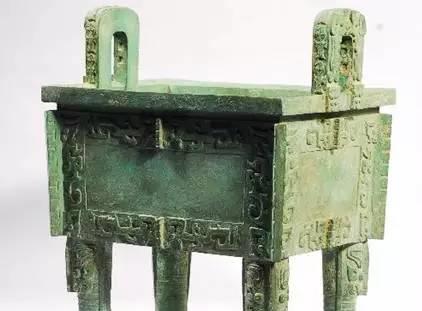Speaking of "Ding", I guess the first picture that pops up in everyone's mind is it——

This big guy weighing 832.84 kilograms, everyone used to call it "Simu Pengding", and later it changed its name, called "Houmu Pengding".
Because of this word, the interpretation of expert teachers is different, some people think that they read "Si", and some people think that they read "Hou"; At the end of March 2011, when the new Guobo Museum opened, Guobojun renamed it "Houmu Pengding".
I have a new name —
Cough, pull away...
Presumably, all the officials already know what the main content of today's xiaobian is going to talk about-
Of course --
- Not this cargo.
Xiaobian wants to find a beating, right?
In fact, what Xiaobian wants to tell you today is - the heavy equipment of the Bronze Age -
Ding, an ancient cooking utensil, is generally three-legged and two-eared. It is also regarded as a heavy weapon for the founding of the country and a symbol of political power. The so-called "Nine Dings of the Son of Heaven and seven dings of the princes" is what it is. Idioms such as "Zhong Ming Ding" and "One Word Nine Ding" also reflect the relationship between Ding and status and power. The Ding is the most emblematic of all bronzes. China's earliest concept of power to dominate the world is directly related to the birth of Ding.
First look at the shape of Ding: generally three feet and two ears. The three legs guarantee the stability of its standing. This was very common in the early Ding.
Late summer grid pattern
Early Shang string pattern Ding
Early Shang yunwending
Early Shang animal face pattern Ding
Early Shang animal face pattern flat foot Ding
There are also more three-legged styles of Ding, in addition to the tapered feet, there are also columnar feet and flat feet.
In addition, during this period, Fang Ding also appeared.
Early Shang beast face pattern Fang Ding
From the perspective of ornamentation, the Ding ornamentation of the Xia Dynasty is relatively simple, and with the development, the ornamentation has gradually become complex from simple. By the early Shang Dynasty, a very mature animal face pattern had appeared on the bronze ding.
This animal face pattern, centered on the animal's face, has a vivid appearance and complex and changeable shapes, or like a tiger, an eagle, or like an ox or a sheep, although it is a little abstract, but it gives people a sense of majesty and mystery. Its basic composition is based on the bridge of the nose as the central axis, symmetrically distributed on the left and right angles, eyes, eyebrows, ears, etc., of which the raised eyes are bright and energetic, not angry and arrogant.